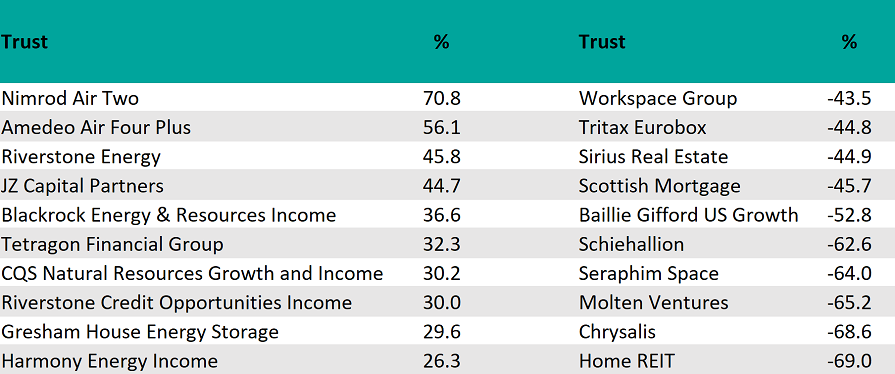The list of top-performing investment trusts in 2022 was dominated by alternative vehicles, including energy and leasing strategies.
For example, top of the table was Nimrod Air Two, a company which buys, leases and sells aircraft. It currently has a portfolio of seven Airbus A380-861 aircraft, all of which are on long-term leases with Emirates.
Like many of its peers in the IT Leasing sector, Nimrod Air Two’s share price collapsed during the pandemic, and its strong performance last year – it made 70.8% – can be attributed to a recovery from a low starting point and a significant narrowing of its discount.
To help screen out the most obscure trusts, Trustnet only analysed investment trusts with assets of at least £50m and excluded VCTs. Had we not applied the £50m filter, Nimrod Air Two would have been beaten by its sister trust, Nimrod Air One, which made 159.9% in 2022. This trust owned a single Airbus A380-861 aircraft, which it sold to Emirates for £25.3m at the end of last year. It will now return these proceeds to shareholders before it is liquidated.
Another aircraft leasing trust, Amedeo Air Four Plus, finished in second place on our list, with gains of 56.1%.
Riverstone Energy finished in third place, with gains of 45.8%. High energy prices meant trusts focused on this area accounted for four of the top-10 positions, although there was a significant amount of diversification within this group.
Best- and worst-perfoming investment trusts in 2022

Source: FE Analytics
For example, Riverstone Energy invests across all sectors in the global energy industry. The trust’s managers are reorienting the portfolio towards renewable energy sources and the technologies that make them more efficient, but chairman Richard Hayden said the high commodity prices worked in favour of its legacy energy investments last year.
BlackRock Energy & Resources Income finished fifth with gains of 36.6%. The trust aims to deliver an income and long-term capital growth by investing primarily in companies operating in the mining and energy sectors.
Gresham House Energy Storage and Harmony Energy Income finished in ninth and 10th place respectively. Both trusts invest in battery energy-storage systems.
The bottom of the list was dominated by property and growth trusts. Analysts at Numis said REITS (real investment trusts) suffered from: a re-pricing of assets due to higher risk-free rates; a financial squeeze on occupiers due to higher debt-servicing costs and other inflationary pressures; and competition from bonds for income-seeking capital.
Discounts in the IT Property UK Residential and IT Property UK Logistics sectors now sit at about the 40% mark.
The worst performer was Home REIT, which invests in social housing for homeless people. It suspended trading yesterday after it announced it would be unable to publish its annual financial report by its deadline.
The trust said it is "being subject to an enhanced set of audit procedures by its independent auditor". This follows the release of a note by Viceroy Research last year which alleged Home REIT bought property at inflated prices and claimed some of its tenants were unlikely to pay any rent. The trust fell 69% in 2022.
Baillie Gifford trusts accounted for the seventh, sixth and fifth worst performers: Scottish Mortgage, Baillie Gifford US Growth and Schiehallion. The Edinburgh-based firm said it has an “unashamedly optimistic mindset” which leads it to invest in out-and-out growth companies, the valuations of which rely heavily on future earnings.
This strategy meant Baillie Gifford’s trusts topped the performance tables in the extended bull run from the end of the financial crisis in 2009 to the middle of 2021, when inflation and interest rates remained low. However, future earnings are worth less when interest rates rise, as they have done this year, which is why these trusts have been pummelled.
This also helps to explain the poor performance of Merian-run Chrysalis, in second-last place, with losses of 68.6%. The trust invests in later-stage private companies with long-term growth potential.
Although these are difficult to value, the trust pocketed £112m in performance fees for the year ending September 2021. This was before the market turned against growth stocks.





